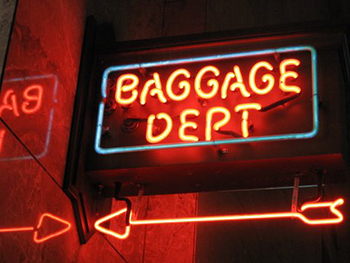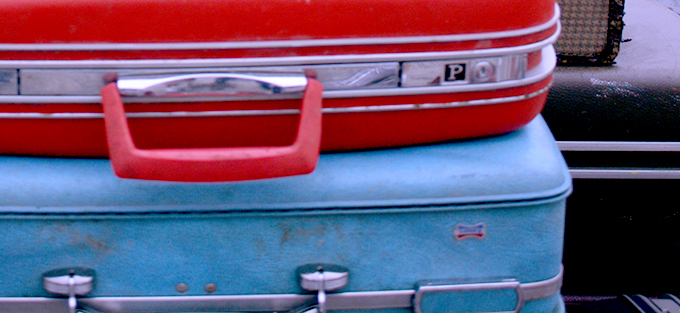by Angela T. Khabeb
Baggage. We all have it and we all have it because we all should. Although the word carries negative connotations, baggage is not always bad. Some baggage is essential.
There are two types of airline baggage: carry-on or checked. Carry-on bags contain things that we might need while in transit, like medications or objects that are fragile or difficult to replace if lost. On the other hand, checked baggage might contain items that aren’t needed right away, or are prohibited in carry-on luggage like a large bottle of shampoo.
I do not travel light. I grab the biggest suitcase I can find and basically cram in as many outfits as possible, because hey, you never know. But actually, I do know.
Even while I’m stuffing superfluous items into my luggage, I’m fairly confident I won’t need them. I lug around unnecessary baggage out of anxiety- worried that the past will repeat itself because once, more than a decade ago, an airline lost my luggage (never mind the numerous times it didn’t happen). I’ve tried, for years, to travel lighter. But lighter travel isn’t necessarily better. Let’s say I’m flying to the North Pole and I only have one tiny carry-on containing three items–a bikini, sun hat and flip-flops. Although this can be defined as traveling light, I would definitely benefit from different choices. Instead of focusing on traveling lighter, it’s more important to travel wiser.
In the broadest sense, we are all travelers, even if on different paths. In this broken world, our journeys have a common destination. Ultimately, we are all traveling towards wholeness. Now, the question is: What shall we pack for this journey? Perhaps you’re wondering. “Wait. Didn’t Jesus say, ‘Take nothing along for the journey’ (Mark 6:8-11)?” Yes, Jesus gave his disciples strict limits on material possessions. But what about emotional baggage?
Prohibited items: shame, guilt, jealousy
 The TSA has a long list of prohibited items. Yet, an item forbidden in carry-on luggage might be permitted in checked baggage or vice versa. So, if you have a pressing need to pack your hatchet, cattle prod or brass knuckles, you’re in luck. Ofcourse, some items are strictly prohibited, like dynamite and hand grenades. This is also true for our journey towards wholeness.
The TSA has a long list of prohibited items. Yet, an item forbidden in carry-on luggage might be permitted in checked baggage or vice versa. So, if you have a pressing need to pack your hatchet, cattle prod or brass knuckles, you’re in luck. Ofcourse, some items are strictly prohibited, like dynamite and hand grenades. This is also true for our journey towards wholeness.
Items like shame, guilt, jealousy, resentment, hostility and rejection should be left behind. On the other hand, some permissible items may surprise you. The TSA allows passengers to carry on a small amount of pepper spray, one cigarette lighter, or one book of matches. Likewise, small amounts of pain, grief and anger are permitted in our emotional baggage because with an ample supply of wisdom and mercy, we will know how to use these items wisely in the future.
Airlines warn passengers about accepting packages from others. This is also sage advice for our wholeness journey because occasionally, we’ll encounter people who emanate negativity. Even worse, we’ll meet toxic people who torpedo others with undue insults, masquerading as their honest opinion. Freedom of speech notwithstanding, we are never required to carry someone else’s baggage. Walk away. Simply leave it behind to revolve on the baggage claim carousel trusting that unattended bags will be confiscated and destroyed.
Jesus’ message for us
Jesus said, “No one sews a piece of unshrunk cloth on an old cloak; otherwise, the patch pulls away from it, the new from the old, and a worse tear is made. And no one puts new wine into old wineskins; otherwise, the wine will burst the skins, and the wine is lost, and so are the skins; but one puts new wine into fresh wineskins.” (Mark 2:21-22).
Jesus offers these illustrations, in part, about criticism about his ministry. The gospels teach us that Jesus was unlike any leader the world had ever seen. He constantly overturned the status quo. Jesus relished broadening boundaries to include those on the margins of society, faithfully upsetting religious leaders. He healed on the Sabbath, talked with gentile women, touched lepers, liberated the poor, ate with sinners and spoke truth to power.
Make no mistake, he was not the kind of Messiah the people expected. Our Jesus astounded people through his revolutionary teachings and unbelievable reversals. He proclaimed that in order to be the greatest, one must become the least. Jesus also insisted the first must be last and whoever desires to save her life must first lose it. Just imagine how stunned the original hearers must have been. Jesus came into their lives and upended nearly every facet of society. Likewise, Jesus comes to us today with similar challenges. He continues to invite us to examine our faith journeys and this is Good News. Reevaluating long-held beliefs often inspires profound transformation. After all, radical renewal is part of our theological DNA.
Discussion questions:
1. In what ways can you travel wiser?
2. Describe any paradigms in your life that need to shift so you can live into your wholeness?
3. Embark on a nightly ritual. Before going to bed reflect on the day and recall at least one specific moment when you recognized the Holy Spirit’s activity in your life. (If this seems especially challenging- here’s a hint: Look for the joy and you will know God is near. “In God’s presence is fullness of joy” Psalm 16:11).
Closing prayer:
Beautiful Savior, thank you for calling us your friend. Thank you for your faithful presence in our lives. Thank you for the gift of your Spirit who empowers us on our journey towards wholeness. When we feel we’ve lost our way, remind us that you are the Way. Continue to deepen our understanding and renew our faith. Teach us to see your Spirit moving around us, so that we will recognize your Spirit moving in us, giving us joy for the journey. Amen.
The Rev. Angela T. Khabeb is the associate pastor at Ascension Lutheran Church in Waukesha, Wis. She has an amazing husband, Benhi, two spectacular sons, Konami and Khenna, and a precious baby girl, Khonni.


Unattended baggage will be confiscated and destroyed! This is GOOD NEWS!
Leave unattended baggage behind. Sometimes you want to mark a positive mark on people that we see are in need of kindness or positive engagement. I try to give love as I can to family, friends and strangers… Knowing when to disengage negativity is our own path, we can try to spread the act of kindness but not to the point of feeling left drained ourselves. That’s where you disengage and let God take over…Leave unattended baggage behind.
This is a great article. We all have emotional baggage but Jesus can see us through the rough times and heal the wounds.
Thank you for writing this article Angela.
Thank you for reminding me to travel lightly. One always has the tendency to only see one side and hear one side…there are always two. We have to remember that without God, we have nothing. Be kind to people. Prayer for people that you are not very fond of. Could change your heart. Remember that you are the truth, the Way, and the Light. Pastor Angela thanks for the reminder to be understanding and humble!!
I really needed this good news today!
Just because you own it, doesn’t mean you have to take it with you.
I absolutely love this article, it was very thought provoking.
Truth! Thank you for the analogy of travel baggage. And thank you for the encouragement to look for the Joy- and know He is in it. God bless you and your work and your family with nothing less than Himself and all his graces.
This is a well written piece, the metaphor you used is totally awesome. I enjoyed reading it.
“in order to be the greatest, one must become the least” loved that statement. Loved the message.
This was awesome! Would luv to be a student in your graces.
Walking away from other folks’ baggage is mighty good advice. Amen and Thank you!
Thank you so much for your feedback!
Let’s continue to hold each other accountable and support one another on this journey!
Blessings to you!